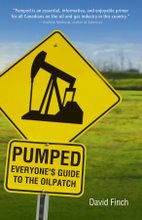Words can be frightening. There is a shudder going through many people in Alberta this fall. Is Alberta about to announce its own NEP?
This week's report by the panel appointed by the Alberta government to investigate the provincial oil, gas and bitumen royalty is being greeted by some as an intrusion into the free enterprise system.
Can you imagine the reaction to this panel's report if its members had been appointed by politicians in Ottawa instead of Edmonton?
A careful readying of the report reveals the shocking assumption that the people own the resource. That they have not been getting a fair share of the profits - for many years. It suggests a modest increase in royalty "take" of about 20% more, if the price of petroleum stays stable.
It calls for government to pay closer attention to the numerous complicated forces that affect the petroleum industry. And for a new government agency to report more frequently and in a clearer manner to the public. For new levels of taxation to make sure the owners of the resource do not lose billions of dollars that is their due.
The panel's report even calls for a Crown Land Conservation Tax on all petroleum, forestry, mining and agricultural activities on government land. The $750 million raised each year would fund research and innovation programs to assure that resource extraction in the future is done with careful consideration for the environment.
And it calls for cumulative effects monitoring. Tens of thousands of oilwells do make a difference.
Had these recommendations been forced on Alberta by Ottawa - like climate change - we could blame it on the Liberals, the NDP or the Green Party. But these suggestions, and many more, came from a business savvy panel of Alberta residents.
Alberta's new premier will respond to this report in a few weeks. Perhaps October 2007 will be remembered as the month when the people of Alberta finally stopped blaming others for their problems - Ottawa, interest rates, the strong dollar, the American economy.
If the people of Alberta are brave enough to create their own Natural Energy Plan that takes charge of the development of their resources, they could provide leadership to the whole country.
Alberta's NEP of 2007 could accomplish what the NEP of 1980 failed to provide - a comprehensive, flexible and responsible reaction to high world oil prices.
For more details on seven previous national energy programs, dating back to Sir John A. Macdonald, and on the forces that create the booms and busts, see the chapters on these topics in PUMPED: Everyone's Guide to the Oil Patch.
Showing posts with label taxation. Show all posts
Showing posts with label taxation. Show all posts
Wednesday, September 19, 2007
Thursday, July 26, 2007
Gas Price Down - Oil Price Up!?
What's up this week with the price at the gas pump? It's falling at the same time that the world price per barrel of oil is reaching a historic high!
And oil is predicted to hit $100 a barrel, perhaps even as soon as the end of this year.
No one complains when the price at the pump drops, but it is good to know why it goes up and down. Even if it seems to bear no relationship to the world price.
Supply and demand are the biggest factors in the day to day movement of the price at the pump. Seasonal demands. Refinery maintenance. Shutdowns for all kinds of reasons. Driving habits.
Did you know that many campground are empty in August throughout the Canadian West because most people take holidays in July?
The biggest part of the price at the pump is still taxes - two or three levels, sometimes more. For more details on this topic see Outrageous - The Price at the Pump in my new book, Pumped: Everyone's Guide to the Oil Patch.
If North American prices at the pump were to go to European or Japanese levels - say $2 per litre - we would all drive smaller cars and trucks and our demand for "foreign" crude could be greatly reduced.
Sounds radical, perhaps, but the price of oil is no higher for other G8 countries that it is for us in North America. It's just that their governments tax gasoline much higher at the pump in order to promote conservation.
There's a Conservative idea that makes sense to me.
And oil is predicted to hit $100 a barrel, perhaps even as soon as the end of this year.
No one complains when the price at the pump drops, but it is good to know why it goes up and down. Even if it seems to bear no relationship to the world price.
Supply and demand are the biggest factors in the day to day movement of the price at the pump. Seasonal demands. Refinery maintenance. Shutdowns for all kinds of reasons. Driving habits.
Did you know that many campground are empty in August throughout the Canadian West because most people take holidays in July?
The biggest part of the price at the pump is still taxes - two or three levels, sometimes more. For more details on this topic see Outrageous - The Price at the Pump in my new book, Pumped: Everyone's Guide to the Oil Patch.
If North American prices at the pump were to go to European or Japanese levels - say $2 per litre - we would all drive smaller cars and trucks and our demand for "foreign" crude could be greatly reduced.
Sounds radical, perhaps, but the price of oil is no higher for other G8 countries that it is for us in North America. It's just that their governments tax gasoline much higher at the pump in order to promote conservation.
There's a Conservative idea that makes sense to me.
Labels:
$100 oil,
conservation,
prices,
supply and demand,
taxation
Subscribe to:
Posts (Atom)

